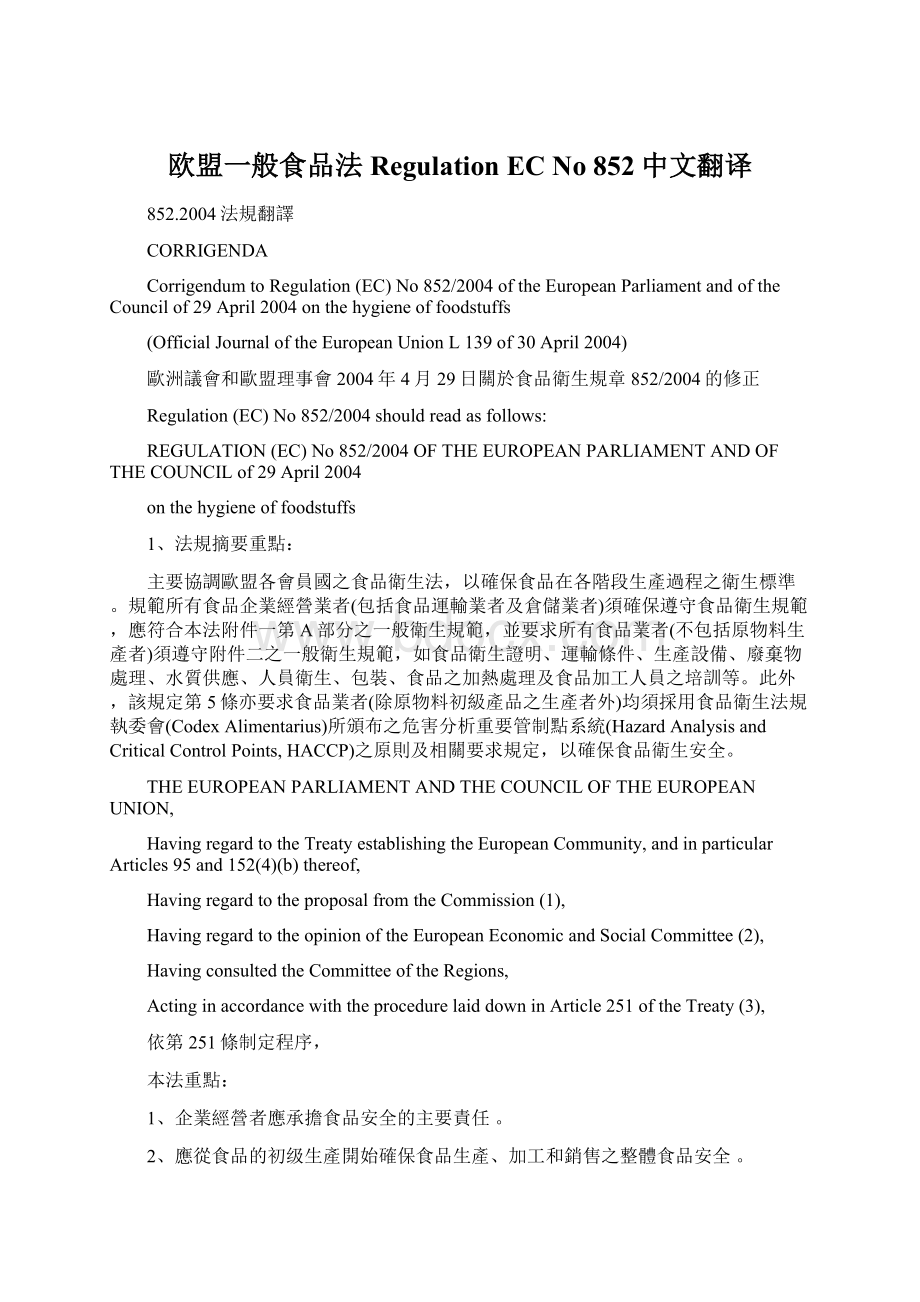欧盟一般食品法Regulation EC No 852中文翻译.docx
《欧盟一般食品法Regulation EC No 852中文翻译.docx》由会员分享,可在线阅读,更多相关《欧盟一般食品法Regulation EC No 852中文翻译.docx(44页珍藏版)》请在冰豆网上搜索。

欧盟一般食品法RegulationECNo852中文翻译
852.2004法規翻譯
CORRIGENDA
CorrigendumtoRegulation(EC)No852/2004oftheEuropeanParliamentandoftheCouncilof29April2004onthehygieneoffoodstuffs
(OfficialJournaloftheEuropeanUnionL139of30April2004)
歐洲議會和歐盟理事會2004年4月29日關於食品衛生規章852/2004的修正
Regulation(EC)No852/2004shouldreadasfollows:
REGULATION(EC)No852/2004OFTHEEUROPEANPARLIAMENTANDOFTHECOUNCILof29April2004
onthehygieneoffoodstuffs
1、法規摘要重點:
主要協調歐盟各會員國之食品衛生法,以確保食品在各階段生產過程之衛生標準。
規範所有食品企業經營業者(包括食品運輸業者及倉儲業者)須確保遵守食品衛生規範,應符合本法附件一第A部分之一般衛生規範,並要求所有食品業者(不包括原物料生產者)須遵守附件二之一般衛生規範,如食品衛生證明、運輸條件、生產設備、廢棄物處理、水質供應、人員衛生、包裝、食品之加熱處理及食品加工人員之培訓等。
此外,該規定第5條亦要求食品業者(除原物料初級產品之生產者外)均須採用食品衛生法規執委會(CodexAlimentarius)所頒布之危害分析重要管制點系統(HazardAnalysisandCriticalControlPoints,HACCP)之原則及相關要求規定,以確保食品衛生安全。
THEEUROPEANPARLIAMENTANDTHECOUNCILOFTHEEUROPEANUNION,
HavingregardtotheTreatyestablishingtheEuropeanCommunity,andinparticularArticles95and152(4)(b)thereof,
HavingregardtotheproposalfromtheCommission
(1),
HavingregardtotheopinionoftheEuropeanEconomicandSocialCommittee
(2),
HavingconsultedtheCommitteeoftheRegions,
ActinginaccordancewiththeprocedurelaiddowninArticle251oftheTreaty(3),
依第251條制定程序,
本法重點:
1、企業經營者應承擔食品安全的主要責任。
2、應從食品的初级生產開始確保食品生產、加工和銷售之整體食品安全。
3、全面推行危害分析重要管制點系統(HACCP)。
4、建立食品微生物標準與食品溫度管制之要求。
確保進口食品符合歐洲標準或與其等效之標準。
Whereas:
鑑於︰
(1)Thepursuitofahighlevelofprotectionofhumanlifeandhealthisoneofthefundamentalobjectivesoffoodlaw,aslaiddowninRegulation(EC)No178/2002(4).ThatRegulationalsolaysdownothercommonprinciplesanddefinitionsfornationalandCommunityfoodlaw,includingtheaimofachievingfreemovementoffoodwithintheCommunity.
(1)食品法律的基本目標之一為追求人類的生命和健康的最高保護,如1993年6月14日公告之規章(EC)No178/2002擬訂食品衛生的一般原則。
此規章也擬訂其他國家和社區的食品法律的一般原則及定義,包括達成食品於歐盟區域內自由流通的目標。
(2)CouncilDirective93/43/EECof14June1993onthehygieneoffoodstuffs(5)laiddownthegeneralrulesofhygieneforfoodstuffsandtheproceduresforverificationofcompliancewiththeserules.
(2)1993年6月14日的委員會指令93/43/EEC在食品衛生擬訂了食品的一般衛生規則,和確認符合該法的程序。
(3)Experiencehasshownthattheserulesandproceduresconstituteasoundbasisforensuringfoodsafety.Inthecontextofthecommonagriculturalpolicy,manydirectiveshavebeenadoptedtoestablishspecifichealthrulesfortheproductionandplacingonthemarketoftheproductslistedinAnnexItotheTreaty.Thesehealthruleshavereducedtradebarriersfortheproductsconcerned,contributingtothecreationoftheinternalmarketwhileensuringahighlevelofprotectionofpublichealth.
(3)經驗顯示這些規則及程序構成確認食品安全的健全基礎。
在一般農業政策內,許多指令已被採取以建立在產品製造和上市的特定衛生規則,這些規則列在條約的附件I。
這些衛生規定降低了相關產品的貿易障礙,在高度保護公共衛生的同時也創造了內部市場。
(4)Withregardtopublichealth,theserulesandprocedurescontaincommonprinciples,inparticularinrelationtothemanufacturers‘andcompetentauthorities’responsibilities,structural,operationalandhygienerequirementsforestablishments,proceduresfortheapprovalofestablishments,requirementsforstorageandtransportandhealthmarks.
(4)關於公共衛生,這些規定和程序包括一般的原則,特別是關於製造廠商和權責機關的責任、結構、操作和廠場的衛生要求、認可的程序,以及倉儲、運輸與衛生標誌的要求。
(5)Theseprinciplesconstituteacommonbasisforthehygienicproductionofallfood,includingproductsofanimaloriginlistedinAnnexItotheTreaty.
(5)這些原則組成所有食品衛生生產的一般基礎,包括條約內附錄I所列的動物性產品。
(6)Inadditiontothiscommonbasis,specifichygienerulesarenecessaryforcertainfoodstuffs.Regulation(EC)No853/2004oftheEuropeanParliamentandoftheCouncilof29April2004layingdownspecifichygienerulesforfoodofanimalorigin(6)laysdowntheserules.
(6)除了這項一般的基礎之外,明確的衛生規章對某些產品為必需的。
委員會於2004年4月29日之歐洲國會規章(EC)No853/2004擬訂具體的動物性食品之衛生規則訂定這些規則。
(7)Theprincipalobjectiveofthenewgeneralandspecifichygienerulesistoensureahighlevelofconsumerprotectionwithregardtofoodsafety.
(7)新的一般和明確之衛生規則的主要目的是為了確保消費者關於食品安全之
高度保護。
(8)Anintegratedapproachisnecessarytoensurefoodsafetyfromtheplaceofprimaryproductionuptoandincludingplacingonthemarketorexport.Everyfoodbusinessoperatoralongthefoodchainshouldensurethatfoodsafetyisnotcompromised.
(8)為了保護從初級生產的地方到包含產品上市或出口的食品安全,整合的方法是必須的。
每個在食品鏈的業者應確保其不違及食品安全。
(9)Communityrulesshouldnotapplyeithertoprimaryproductionforprivatedomesticuse,ortothedomesticpreparation,handlingorstorageoffoodforprivatedomesticconsumption.Moreover,theyshouldapplyonlytoundertakings,theconceptofwhichimpliesacertaincontinuityofactivitiesandacertaindegreeoforganisation.
(9)歐盟區域法規不適用於國內私人使用,或供應國內私人使用之國內加工、處理或食品儲存。
而且,其應只適用於具特定連續性的活動和一定程度組織的事業。
(10)FoodhazardspresentatthelevelofprimaryproductionshouldbeidentifiedandadequatelycontrolledtoensuretheachievementoftheobjectivesofthisRegulation.However,inthecaseofthedirectsupplyofsmallquantitiesofprimaryproducts,bythefoodbusinessoperatorproducingthem,tothefinalconsumerortoalocalretailestablishment,itisappropriatetoprotectpublichealththroughnationallaw,inparticularbecauseofthecloserelationshipbetweentheproducerandtheconsumer.
(10)存在於初級生產階段的食品危害應該被鑑定出並被適當的控制,以確保達成本規章的目標。
然而,在初級產品少量直接供給的例子,由食品業者製造,到最終消費者或地方零售,由國家法律保護公共衛生是適當的;特別是因為製造者和消費者之間的關係密切。
(11)Theapplicationofhazardanalysiscriticalcontrolpoint(HACCP)principlestoprimaryproductionisnotyetgenerallyfeasible.However,guidestogoodpracticeshouldencouragetheuseofappropriatehygienepracticesatfarmlevel.Wherenecessary,specifichygienerulesforprimaryproductionshouldsupplementtheseguides.Itisappropriateforthehygienerequirementsapplicabletoprimaryproductionandassociatedoperationstodifferfromthoseforotheroperations.
(11)危害分析重要管控點(HACCP)的應用原則在初級生產業尚未普遍可行。
不過,良好規範的指引應該鼓勵農場階段使用適當的衛生規範。
必要時,初級生產的特定衛生規則應補充這些指引。
適用於初級生產及相關業者的衛生要求不同於其他業者是適當的。
(12)Foodsafetyisaresultofseveralfactors:
legislationshouldlaydownminimumhygienerequirements;officialcontrolsshouldbeinplacetocheckfoodbusinessoperators’complianceandfoodbusinessoperatorsshouldestablishandoperatefoodsafetyprogrammesandproceduresbasedontheHACCPprinciples.
(12)食品安全由許多因素所構成︰法令應該訂定最低的衛生要求、官方管制應檢查食品業者是否遵守法令規定?
食品業者應該依HACCP原則建立及執行食品安全計畫和程序
(13)SuccessfulimplementationoftheproceduresbasedontheHACCPprincipleswillrequirethefullcooperationandcommitmentoffoodbusinessemployees.Tothisend,employeesshouldundergotraining.TheHACCPsystemisaninstrumenttohelpfoodbusinessoperatorsattainahigherstandardoffoodsafety.TheHACCPsystemshouldnotberegardedasamethodofself-regulationandshouldnotreplaceofficialcontrols.
(13)依HACCP的原則為基礎,程序的成功實施需要食品業者員工之全力合作和承諾。
為此目的,員工應經過訓練。
HACCP系統是幫助業者達成更高標準的食品安全,而不應被認為是自主管理的方法且不應取代官方管制。
(14)WhiletherequirementofestablishingproceduresbasedontheHACCPprinciplesshouldnotinitiallyapplytoprimaryproduction,thefeasibilityofitsextensionwillbeoneelementofthereviewthattheCommissionwillcarryoutfollowingimplementationofthisRegulation.Itis,however,appropriateforMemberStatestoencourageoperatorsatthelevelofprimaryproductiontoapplysuchprinciplesasfaraspossible.
(14)雖然依HACCP原則建立之程序要求,不應一開始就使用於初級生產,其延伸的可行性將是審查的一個要件,委員會將完成接下來本規章的執行。
然而,會員國鼓勵初級生產者盡可能去採用這樣的原則是適當的。
(15)TheHACCPrequirementsshouldtakeaccountoftheprinciplescontainedintheCodexAlimentarius.Theyshouldprovidesufficientflexibilitytobeapplicableinallsituations,includinginsmallbusinesses.Inparticular,itisnecessarytorecognisethat,incertainfoodbusinesses,itisnotpossibletoidentifycriticalcontrolpointsandthat,insomecases,goodhygienicpracticescanreplacethemonitoringofcriticalcontrolpoints.Similarly,therequirementofestablishing‘criticallimits’doesnotimplythatitisnecessarytofixanumericallimitineverycase.Inaddition,therequirementofretainingdocumentsneedstobeflexibleinordertoavoidundueburdensforverysmallbusinesses.
(15)HACCP的要求應考慮國際法典中的原則。
其應提供足夠的彈性以適用所有的情況,包括小型企業。
尤其,必須了解在某些食品業裡,辨別危害管控點是不可能的,某些例子中,良好衛生規範可以取代危害管控點的監控。
相同地,建立「關鍵界限」的要求並非指在每一例中需要固定一數量限制。
除此之外,為了避免對很小的公司造成不合理的負擔,保留文件之要求需要有彈性。
(16)Flexibilityisalsoappropriatetoenablethecontinueduseoftraditionalmethodsatanyofthestagesofproduction,processingordistributionoffoodandinrelationtostructuralrequirementsforestablishments.Flexibilityisparticularlyimportantforregionsthataresubjecttospecialgeographicalconstraints,includingtheoutermostregionsreferredtoinArticle299
(2)oftheTreaty.However,flexibilityshouldnotcompromisefoodhygieneobjectives.Moreover,sinceallfoodproducedinaccordancewiththehygieneruleswillbeinfreecirculationthroughouttheCommunity,theprocedureallowingMemberStatestoexerciseflexibilityshouldbefullytransparent.Itshouldprovide,wherenecessarytoresolvedisagreements,fordiscussionwithintheStandingCommitteeontheFoodChainandAnimalHealthestablishedbyRegulation(EC)No178/2002.
(16)彈性也適用於能夠繼續使用在任何生產、加工或食品分送階段以及廠場結構的傳統方法。
彈性對於在特別限制中之區域特別的重要,尤其是地理受局限的地區,包括條約第299
(2)條提到之最偏遠的地區。
然而,彈性不應影響食品衛生的目標。
而且,既然所有食品製造是依照衛生規則將在整個歐盟內自由流通,允許會員國採行彈性之作法程序應充分透明。
依規章(EC)No178/2002.,應該在食物鏈和動物衛生常務委員會討論中,提供解決歧見。
(17)Thesettingofobjectivessuchaspathogenreductiontargetsorperformancestandardsmayguidetheimplementationofhygienerules.Itisthereforenecessarytoprovideproceduresforthatpurpose.Suchobjectiveswouldsupplementexistingfoodlaw,suchasCouncilRegulation(EEC)No315/93of8February1993layingdownCommunityproceduresforcontaminantsinfood
(1),whichprovidesfortheestablishmentofmaximumtolerancesforspecificcontaminants,andRegulation(EC)No178/2002,whichprohibitstheplacingonthe